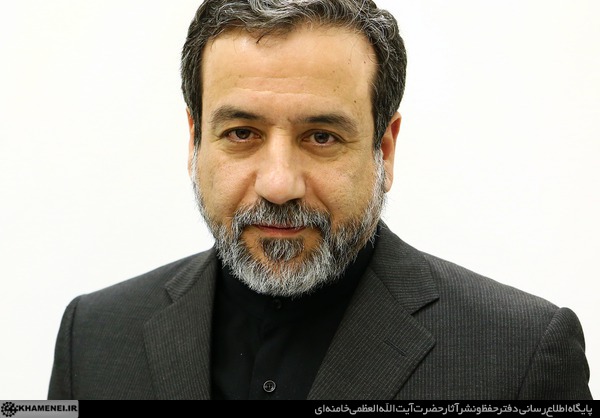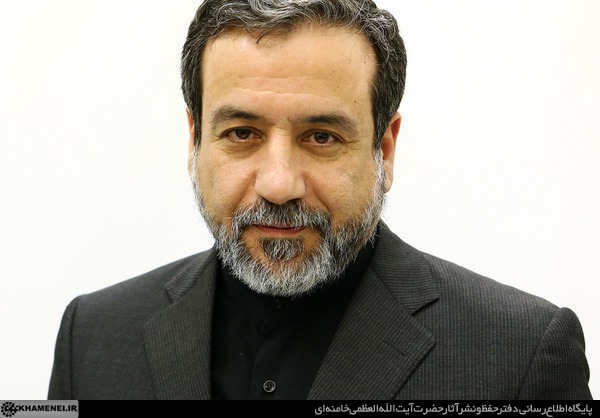 TEHRAN, Nov. 10 (MNA) ĖIn an extensive interview with Khamenei.ir, Iranís senior negotiator Seyed Abbas Araghchi elaborated on the role of the Leader in nuclear talks.
TEHRAN, Nov. 10 (MNA) ĖIn an extensive interview with Khamenei.ir, Iranís senior negotiator Seyed Abbas Araghchi elaborated on the role of the Leader in nuclear talks.Over the past year, Iranís Leader has expressed his opinions in regard to nuclear negotiations with the West, and their performance in this respect. Assuming a decisive stance against Israel ahead of the Geneva talks or Iranís practical need for 190,000 SWU were among the most important issues raised by the Leader, which proved to have a great impact on the negotiation progress. In an interview to Khamenei.ir, Iranís senior negotiator Seyed Abbas Araghchi discussed the role of the Leader in nuclear talks. He also explained how the negotiation team interacts with the Leader, as well as the process of determining red lines for the nuclear program.
Has Iran's foreign policy strategy undergone any changes over the years and during the negotiations or it has always followed a set of fixed principles?
I believe that Iranís foreign policy has always followed certain principles drawn by the Leader, and governments have been striving to pursue them in accordance with their own capacities. Of course they can differ in tactics, but Iranís foreign policy which has always been founded on resistance against the hegemony, in accordance with national interests and principles of the Islamic Revolution, has always remained within a fixed and specific framework.
I have always stressed that it is Iran which is the ultimate deciding factor in the course of nuclear talks. At times, certain events have occurred in the process of this case which might have appeared to be unfavorable, but in a wider view, we can use these happenings to make better decisions in the future. For instance, at some point, Iran agreed to the suspension of nuclear activities proposed by the West. This suspension proved to be an unsuccessful, but necessary experience. It proved to Iranian people as well as the government that the rights of the Islamic Republic cannot be achieved through mere negotiation and compromise with the West. Thus, the suspension broke off after two and a half years and our nuclear program resumed. We learned from that experience and commenced manufacturing nuclear equipment, nuclear facilities, increasing the number of centrifuges, but most importantly, training human resources in the field of nuclear technology; all of these are the results of that experience.
Our nuclear scientists progressed to such an extent that the enemy was forced to physically remove them, and this is a witness to our great performance in the nuclear field. Now we can bring a wide range of experiences and achievements to the negotiation table. During all these years, we never left the negotiation table, and attended every talks that had been to the benefit of our country.
Making decisions and drawing red lines on the nuclear issue are all conducted through fully consultative and democratic mechanisms. Iranian peopleís great persistence in the face of all the pressures and sanctions imposed by the West together with brilliant leadership all led to Iranís being where it is standing now, self-sufficient in the †production of nuclear fuel which is perhaps the most sensitive part in the nuclear industry.
On the other hand, alongside the nuclear issue, there was also an ongoing war of dominance and submission, and we did not want to submit to the enemy. They insisted on suspending Iranís enrichment program but we did not consent to it. The Security Council issued six resolutions that all called for the immediate suspension of all enrichment activities in Iran, but we resisted. After ten years of resisting, and only after the West consented to Iranís enrichment program did we decide to negotiate with them, and in this battle of wills, the will of the Islamic Republic came out victorious. This persistence went so far that the West declared that Iran is allowed to continue its enrichment program. The Americans once would not even concur with Iranís having a nuclear plant, but now they have come to terms with us having as many plants as we need. During all this, the Leaderís advice on Iranís foreign policy has been most impactful.

Ever since the new negotiating team was formed, the Leader has given his special support to them at various points in time. Would you elaborate on these supportive acts and how they influenced the process of the negotiations?
The Leader has always supported Iranís administrative agents, and the nuclear negotiations have been no exception. The issue on Iranís need of 190,000 SWU was a good example of the Leaderís effective decision-making. At certain points the negotiating parties expressed doubt about whether Iranís enrichment could have an industrial dimension or they wanted to limit the program, but the Leaderís intervention proved to be very decisive. After that, Iranís industrial enrichment has become an established issue in the negotiations.
The Leader once stated that he is not a diplomat, but a revolutionary. This may indicate that being a diplomat is in contrast to being a revolutionary. But after he called you Ďchildren of revolutioní this ambiguity was cleared. What do you think the features of a Ďrevolutionary diplomatí are?
To be a revolutionary diplomat means to be both a diplomat and follow the diplomatic strategy and at the same time maintain the revolutionary principles and proceed with diplomacy from the revolutionary viewpoint. In the Ministry of Foreign Affairs, we are all striving to fulfill those principles that are uncontroversial for the Revolution, and those are Ďresisting against hegemonyí, Ďmaintaining the dignity of Iraní, Ďmaintaining peopleís rightsí, Ďmaintaining national interestsí, and Ďpreserving national securityí.
The Leader has taken certain stances ahead of negotiations, for instance, before the Geneva talks, he delivered a speech on the Zionist regime, or at another time, he raised the issue of 190000 SWU, or at some points he has criticized the performance of some of the six states quite frankly. What kind of impact did these stances have on the process of negotiations?
They have been very effective; in the case of the 190000 SWU, the Leaderís decisive stance turned the tables in our favor. The West demands too much in their foreign policy and thinks of themselves as superior, but we were able to resist this treatment during the negotiations thanks to the Leaderís advice. The Leaderís frank tone in addressing some of the negotiating parties has at points led to the Westís stopping their insistence on their too demanding policy and realizing that they are negotiating with a dignified nation and thus cannot talk or behave as they please.

Why Iran is obligated to observe red lines?
First of all, having Ďred linesí is not an uncommon issue and all countries have them. For example, resisting hegemony is one of the Islamic Republicís principles. No one inside Iran is allowed to submit himself or the country to an outside power. Iranís dignity is also a red line. We are ready to bear the hardest form of sanctions and threats but not let the dignity of our country be doubted.
Secondly, Iranian people are now realizing that the peaceful uses of nuclear technology are very crucial for the development of our countryís economy. Although we have considerable oil and gas resources, these resources will one day run out. We should not use them solely to produce electricity. Nuclear energy can lead to the development of about 300 other technologies or industries in Iran.
Thirdly, nuclear technology has turned into a national pride and made our people confident. The fact that six powerful states are willing to negotiate with Iran shows how much developed and dignity Iran has gained so far.
Our resistance against the will of the West is the key to our power. And it is this very resistance which the West is afraid of and not a nuclear bomb.
How the negotiating team interacts with the Leader?
The Leader holds the highest position in the country and is knowledgable in all necessary fields. However, he also recognizes a particular amount of freedom for his commanders to move and maneuver. That some claim that the process of negations goes through with him thoroughly or that he is not aware of the progress at all are both incorrect. In fact, there is a reasonable procedure in this respect.

Are you optimistic about the negotiations?
Optimistic, not; but Ďhopeful,í yes. We are not Ďoptimisticí about the intentions and goals of the other party, but are in fact optimistic and hopeful about the possibility of an agreement. The Muscat talks are one of the key points in the negotiations and I believe many issues will come to light as a result of these meetings. Should some conflicting issues be resolved in Muscat, we can then be optimistic about the ultimate result.
Some may believe that the red lines are all decided by the Leader, while the truth is that they are agreed upon by a collective will. Could you elaborate on this?
I seriously believe that the decision-making system in Iran is strongly democratic. All the decisions that are ultimately declared by the Leader have gone through a very long and complicated procedure. During this procedure, all for and against viewpoints are expressed and then are integrated into the National Security Council to form a coherent idea. Then the Leader observes this idea and issues it if he sees fit. Even during the worst crises in the region, the Islamic Republic has managed to take the best decisions and come out victorious. During the crises in Afghanistan, Iraq, Syria and the Middle East in general, all analysts consider Iran the "island of stability" that triumphs over the crisis.
By Mehr News Agency
The Iran Project is not responsible for the content of quoted articles.











